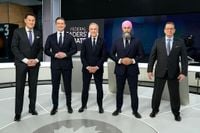As the countdown to the Canadian federal election on April 28, 2025, continues, the political landscape is rapidly changing. Liberal leader Mark Carney, Conservative leader Pierre Poilievre, NDP leader Jagmeet Singh, and Bloc Québécois leader Yves-François Blanchet recently wrapped up a critical debate week, making their final pitches to voters in both English and French. This series of debates has sparked intense discussions about key issues facing Canadians, with topics such as trade, sovereignty, and the high cost of living taking center stage.
Yahoo News Canada is inviting users to weigh in on which leader they believe performed best in the debates and what issues are most important to them as they prepare to cast their ballots in this pivotal election. The English-language debate featured the leaders exchanging ideas on Canadian trade and sovereignty, emphasizing that the nation must do more to strengthen its domestic economy.
The French-language debate, held in Montreal on Wednesday night, saw the leaders engage in a lively exchange on various themes set by the event organizers. Among the lighter moments was a commitment from the leaders to stop purchasing American strawberries in favor of promoting Canadian-grown products, reflecting a broader theme of national pride amid increasing tensions with the United States.
As domestic issues dominated the political discourse leading up to December 2024, the inauguration of U.S. President Donald Trump on January 20, 2025, shifted the focus. Trump's repetitive threats to annex Canada and engage in a trade war have led to a deterioration in U.S.-Canada relations, prompting a wave of patriotism among Canadians. This newfound unity has raised questions about how these factors will influence voter behavior in the upcoming election.
Recent polling data indicates that the Liberals are making a comeback after experiencing their lowest numbers during Justin Trudeau's tenure. Carney's ascension to leadership appears to have revitalized the party, particularly in light of Trump's aggressive stance towards Canada. A recent Ipsos poll suggests that while the Liberals have lost some ground, they continue to lead, albeit with a narrowing margin as the Conservatives gain traction.
Young voters have emerged as a critical demographic in this election, with federal parties implementing strategies to engage them. A new poll by Leger reveals that nearly half of voters aged 18 to 34 are still undecided, with only 58 percent indicating their vote is locked in. This group is particularly open to persuasion, with 41 percent stating they could change their minds before election day.
As the campaigns unfold, stark differences in advertising strategies have emerged between the parties. A digital ad analysis shows that the Conservatives are focusing on Gen Z and Millennial voters, while the Liberals are targeting older voters and those in Francophone Canada. This demographic and geographic battleground reflects the varied approaches each party is taking to secure their voter bases.
In the lead-up to the election, the competition has tightened significantly. The Conservatives, who previously held a strong lead for over a year, are now facing a formidable challenge from the Liberals. Some Conservatives express skepticism about the accuracy of polling data, questioning whether it accurately reflects their support base, particularly among younger, less politically engaged voters.
The NDP's support appears to have diminished compared to previous campaigns, and the Bloc Québécois is struggling to keep pace with the Liberals in Quebec. Various polls indicate that Liberal support is largely driven by fear of Trump's policies, while Conservative support is based on hope for a better future.
Carney is increasingly viewed as the candidate capable of managing the tariff war with Trump, while Poilievre is perceived as stronger on domestic issues such as cost of living, immigration, and law and order. The latest Postmedia-Leger poll, released on April 16, 2025, underscores the shifting dynamics as the Liberals and Conservatives vie for voter loyalty.
As Canadians await the next English-language debate, an Angus Reid poll published on April 17 reveals that many Liberal supporters are not fully committed to their party. While 63 percent of Liberal voters describe themselves as "very committed," only 30 percent consider themselves "fairly committed." In contrast, Conservative voters exhibit higher commitment rates, with 76 percent stating they are "very committed" and 18 percent "fairly committed."
The NDP stands to gain from any wavering Liberal support, as 45 percent of uncommitted Liberal voters indicate the NDP would be their second choice, while 18 percent would opt for the Conservatives. This data highlights the precarious position of the Liberals as they head into the final stretch of the campaign.
Shifts in voter priorities are also becoming apparent. Health care has surged to the forefront of voter concerns, with 38 percent identifying it as a top issue, surpassing the tariff issue at 29 percent. Inflation and the cost of living remain the most pressing concerns for 56 percent of respondents. Interestingly, the number of Canadians identifying U.S.-Canada relations, including tariffs, as their top concern has dropped by 12 points over the past month.
During the recent French-language debate, Singh repeatedly raised the issue of health care, even though it was not among the five officially chosen themes. This insistence on health care highlights the growing importance of this issue among voters, despite its absence in the upcoming English-language debate, which will focus on affordability, energy and climate, public safety, and tariffs.
As the election date approaches, polling data from Angus Reid indicates a tightening race, with Liberal support at 45 percent and Conservative support at 39 percent. The NDP and Bloc Québécois are tied at seven percent, while the Green Party is polling around one percent. Notably, three in five Canadians hold an unfavorable view of Poilievre, a record high that poses a challenge for his campaign.
With just over ten days left before the votes are cast, the stakes are high for all parties involved. The political landscape is dynamic, and as Canadians prepare to make their voices heard, the outcome remains uncertain. The upcoming debates will play a crucial role in shaping voter perceptions and ultimately determining the direction of the country.







